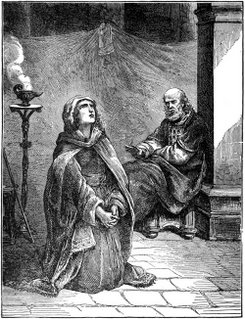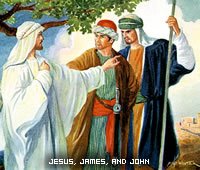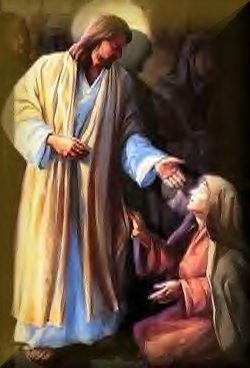King of Kings
Our Gospel takes us in to the court room today. Pontus Pilate is the supreme judge. He is the right hand man who collects taxes for the Emperor. He is a ruling authority figure of Rome. He alone decides if a person will live or die.
As Pontius Pilate entered the headquarters again, he summoned Jesus, and asked him, "Are you the King of the Jews?" ) I hear Pilate asking this with a bit of a sneer, as Jesus is bound, beaten and bleeding as he stands before Pilate. - He certainly didn't look like a king.)
Jesus answered, "Do you ask this on your own, or did others tell you about me?"
Pilate reminds Jesus that he is not a Jew, but the authority of Rome. Your own nation and the chief priests have handed you over to me. What have you done?"
Jesus answered, "My kingdom is not from this world. If my kingdom were from this world, my followers would be fighting to keep me from being handed over to the Jews. But as it is, my kingdom is not from here."
Pilate asked him, "So you are a king?"
Jesus answered, "You say that I am a king. For this I was born, and for this I came into the world, to testify to the truth. Everyone who belongs to the truth listens to my voice."
As so we have the clash, the collision of two kingdoms. The Kingdom of Rome, where the Emperor often claimed the status of God, and this man Jesus, born in a place known as Garbage City, Nazareth, who also claimed to be God, and whose Kingdom was not of this world. Two kingdoms on a collision course.
When one looks at the evidence, it is pretty damning against the man from Nazareth. First of all, it would appear, that the man who raised him was not his ‘real" father. There was more than a hint of scandal that surrounded his birth.
When one looks at the evidence of this man from Nazareth, it would have been so easy on the one hand, give his background and scandal surrounding his birth to just dismiss him as a madman. However, there were those who believed him to the Messiah - sent by God - and how could one discount the miracles, healings and all the other things this man from Nazareth was said to have done.
Pontus Pilate was not sure that Jesus was guilty of anything. He knew that the religious leaders were envious of Jesus and wanted Pontius Pilate to do their dirty work for them. But Pontus Pilate was smarter than that. He was in luck - because of his position of authority he could pass the buck and did so, by sending Jesus of to Herod. Pilate quickly washed his hands of the whole thing.
There was some talk some thirty years before of a baby born in Bethlehem, and how some kings from far away countries had come to worship this baby born to be King of the Jews. The then ruling king of the day, King Herod, a suspicious man who had murdered his own sons, ordered the deaths of all male Jewish babies, under the age of two, in an demented attempt to eradicate the threat to his throne. However, it’is unlikely that this Herod knew about such events so long ago. This Herod too was concerned about any threat to his seat of power.
From what Herod had heard about Jesus, he was greatly pleased to meet Jesus, and was hoping that Jesus might perform some miracle. Herod plied him with many questions, but Jesus gave no answers in return.
The chief priests and the other religious leaders where standing there vigorously accusing Jesus. Then Herod and his soldiers ridiculed and mocked Jesus. They dressed him in an elegant robe, then after they had their little bit of fun, dehumanizing him, and mocking him, Herod sent him back to Pilate. Its not so easy passing the buck. And so Pilate, who began the dialogue by asking Jesus if he was a king, ended by wanting to please the crowd, and secure his hold on power, had Jesus flogged and then handed him over to be crucified.
We often name the name of Christ and either do not accept or comprehend or believe what we are saying. For example: a recent Gallop Poll revealed that more than 86% of those asked and who considered themselves Christian, less than half knew who preached the Sermon on The Mount. when asked.
The same Poll showed that 60% of those asked were in Church last Easter, but one out of four did not know what Easter celebrates. So when we name Jesus as King, when we call him Lord, do we know what we are doing? Do we accept it and believe it? And if we accept it and believe it, do we understand it?
In the published diaries of Joseph Goebbels, the infamous Nazi Propagandist, there are two or three references to Mahatma Gandhi. Goebbels believed that Gandhi was a fool and a fanatic. If Gandhi had the sense to organize militarily, Goebbels thought, he might hope to win the freedom of India.
He was certain that Gandhi couldn't succeed following a path of non-resistance and peaceful revolution. Yet as history played itself out, India peacefully won her independence while the Nazi military machine was destroyed. What Joseph Goebbels regarded as weakness actually turned out to be strength. What he thought of as strength turned out to be weakness.
Who could blame Pontius Pilate or Herod for treating Jesus as they did. They had all the power, Jesus had no power, or so it seemed. They both held positions of great authority, but Jesus was a homeless nomad who moved from town to village to city. He had caused a stir while in Jerusalem, by first riding in on a donkey, as if claiming to be some sort of king, and then by causing a scene in the temple, when he overturned tables and chased people out of there by using a whip. He accused them of being robbers and theives.
In today’s readings were are being asked to "look through eyes of faith" Pilate and Herod only saw a man, a very ordinary man at that. The only saw a man who should be crucified. Little did they know that the crown of thorns would be symbolic of the fact that Jesus is not only King of the Jews, He is King of Kings.
How could they know that the cross, an instrument of torture would become a symbol of triumph? How could they know that the cross would become a throne?
You see, all those involved, especially Pontius Pilate and Herod, all they could see was the end not only of this man’s ministry, but of his life. They thought they had silenced him for good.
Even the disciples thought it was all over. They were so afraid at this turn of events that they immediately went into hiding. They thought this was the end.
Even the woman who followed Jesus, they thought this was the end. Did they not see his lifeless body, borken and bleeding, taken down from the cross and placed in the tomb? What else could they think, but think this was the end.
Even his own mother, standing there at the cross, her tears and cries for all to hear. Her child, her son, now nailed to a cross. He was put to death as a common criminal. How could Mary think anything else that this was the end.
But when we only see an ending, God sees a beginning.
When we think it is all over, God begins something new.
When we think all is hopeless - God offers us hope.
We now know, that the crucified Christ is the Risen Christ.
As yes, we know that Pilate got it right. Jesus is indeed a king.










